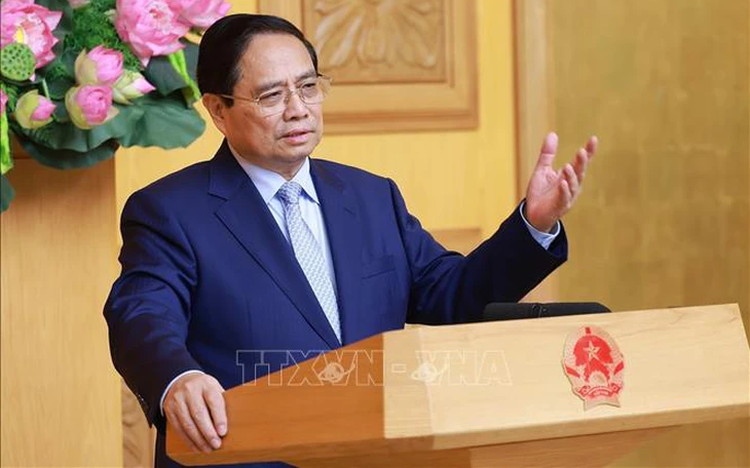
Prime Minister Pham Minh Chinh speaks at a roundtable discussion between the Vietnamese government and leaders of 25 British enterprises in Hanoi, June 28, 2025. Photo: Vietnam News Agency
She made this statement at a roundtable chaired by Prime Minister Pham Minh Chinh in Hanoi, attended by leaders of 25 British enterprises operating in Vietnam.
Deputy Minister Ngoc reiterated the country's determination to develop IFCs in Ho Chi Minh City and Da Nang, following a resolution passed by the lawmaking National Assembly.
Under the direction of the all-powerful Politburo and the government, relevant ministries will swiftly draft eight decrees to implement the resolution, a plan that aligns with the Politburo's guidance and the draft IFC roadmap, the official stated.
These future IFCs aim to mobilize international resources around three key pillars: green economy, digital economy, and innovation – a structure supported by experts.
Regarding long‑term incentives, Ngoc noted that draft regulations include corporate income tax and personal income tax benefits to support voluntary pension funds and other financial vehicles.
As the new decrees are developed, the finance ministry will propose to relevant authorities additional amendments and enactments of tax policies aligned with Vietnam's tax reform strategy through 2030 and international best practices.
Regarding policies for IFCs, the ministry will design targeted tax policies to ensure competitiveness within the region.
"However, we do not want to become a 'tax haven' to attract financial institutions. This is a challenging task and we very much hope for your cooperation," Ngoc emphasized.
"All IFCs are very careful to avoid becoming 'tax havens' which can attract foreign financial institutions.
"We will follow the same approach."
On the proposal to apply the financial-center policy nationwide instead of restricting it to Ho Chi Minh City or Da Nang, Ngoc explained that a clear and specific legal framework is a prerequisite.
For an emerging market like Vietnam, it is essential to identify specific locations where a transparent legal framework aligned with international standards can be implemented.
Extending the policy nationwide at this stage, she said, would be very challenging to implement effectively, Ngoc explained.
Warrick A. Cleine MBE, chairman of the British Corporate Advocacy Council, described the government's resolution to establish IFCs as a 'strategic catalyst' capable of elevating Vietnam's financial industry, including green finance.
Cleine, who is also chairman and CEO of KPMG Vietnam and Cambodia, expressed confidence that the initiative will drive growth across exports, capital markets, energy transition, and the pension and savings sectors – areas in need of greater attention.
He urged Vietnam to learn from London's global hub experience and recommended that the government review proposed reforms related to the future IFCs – especially work permit approvals, personal income tax exemptions, and measures to accommodate both domestic and foreign investors in the financial market.
He also called for continued development and sharing of international legal practices and the adoption of IFRS standards.
Cleine hoped Vietnam would create favorable conditions for existing financial institutions and build on the strong foundations of Vietnamese financial institutions and British companies already operating in the country.
Deputy Governor of the State Bank of Vietnam Nguyen Ngoc Canh said that in response to British recommendations on developing IFCs, the central bank has been actively working with U.K.–based HSBC.
He emphasized that all banking policies and foreign exchange activities at Vietnam's IFCs will be based on lessons from international experience and guided by a roadmap tailored to Vietnam's needs.
Canh noted that the central bank fully supports enhancing the presence and contribution of British banks in drafting resolutions and decrees on licensing foreign exchange managing banks owned by foreign investors.
"Through the British Corporate Advocacy Council, I encourage British companies to participate more actively in the development of Vietnam's IFCs," Canh said.
"We believe their experience will have practical significance for Vietnam's economic development."


Max: 1500 characters
There are no comments yet. Be the first to comment.